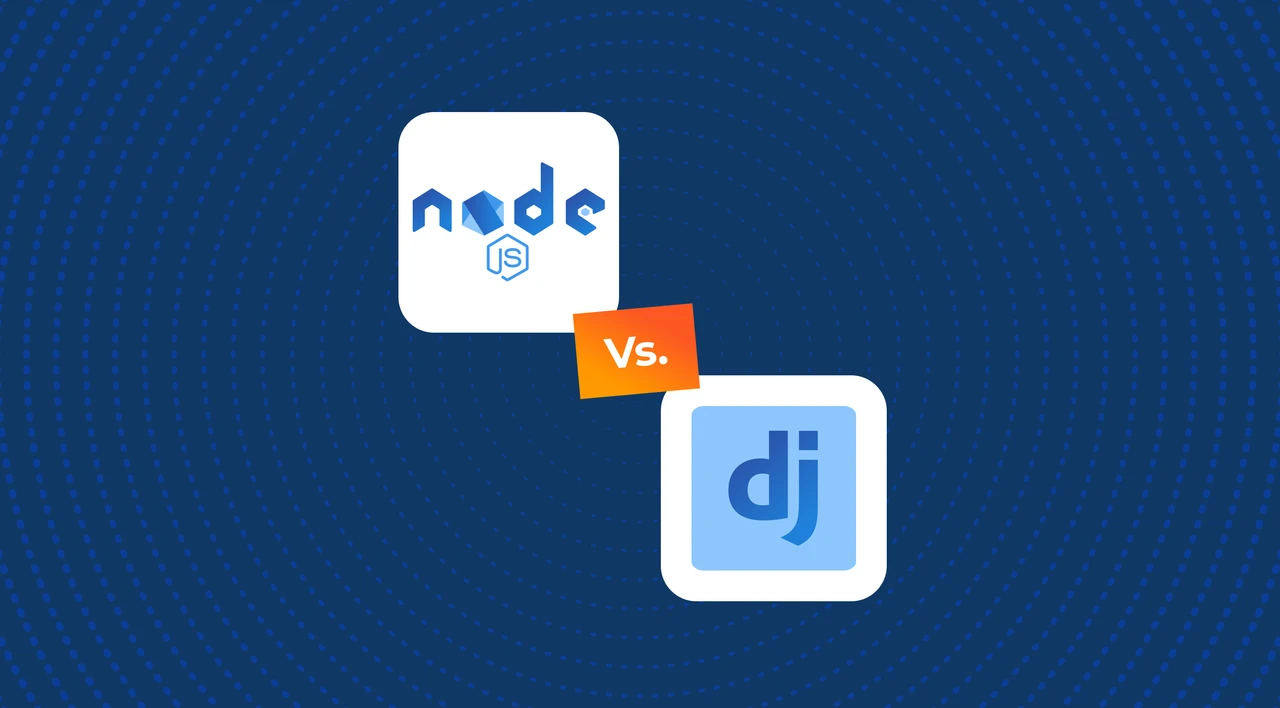SHARE
Node.js vs. Django: Which is Better in 2025?

Contents
Contents
Looking for the best web-development framework and not sure where to start? Many app developers in 2024 have difficulty deciding between Node.js and Django.
Node.js and Django: Which is Better in 2024?
The two are part of the most popular web frameworks in use today.
They are both open sources, free to use and have a large community of developers contributing to their projects.
This article looks into each framework’s history, strengths, and weaknesses. We will also look at where they fit into the future of web development. Keep reading to find out!

What is Node.js?
Node.js is a popular open-source framework for building applications. It’s used by companies like PayPal, Netflix, and Uber to build their web applications.
Node.js joined the market in 2009 as a creation of Ryan Dahl. It has since undergone several updates to improve the developer experience.
The JavaScript runtime environment is built on the v8 JavaScript execution engine. Developers can easily read any JavaScript code from the JavaScript date library on Node.
What is Node.js Used For?
You can run web applications outside the browser used by the client using Node.js. The JavaScript runtime platform and library help you develop server-side web applications.
Node.js is the best framework for data-intensive applications because it uses an event-driven and asynchronous model.
Popular Node.js Web Frameworks
Here are some of the most popular Node.js web frameworks.
Express.js
Express.js is the most widely used.
Koa.js
Koa.js is a minimalist web framework that builds on top of Express.js. It focuses on providing developers with a set of powerful middleware that can be easily integrated into an application.
Hapi.js
Hapi.js is a robust, open-source web framework perfect for building large-scale, enterprise-level applications.
It features a powerful plugin system allowing developers to add application functionality easily.
Meteor.js
Meteor.js is a full-stack framework designed to simplify building real-time web applications.
It provides developers with a set of tools for building both client-side and server-side code.
Nest.js
Nest.js is a progressive Node.js framework designed to help developers build scalable network applications.
It’s built on top of Express.js and provides features that make it easy to develop enterprise-level applications.
Sails.js
Sails.js is a modern MVC (Model-View-Controller) web framework built on top of Node.js and Express.js.
It’s designed to simplify building real-time, scalable, and data-driven web applications.
LoopBack
LoopBack is a highly extensible, open-source Node.js framework perfect for building RESTful APIs and microservices.
It provides developers with tools for building scalable, modular, and highly customizable applications.
These are just a few of the many Node.js web frameworks available. The best one for your project will depend on your needs and skills.

What is Django?
Django is a free and open-source web framework in Python that follows the model view controller architectural pattern (MVC).
What is Django used for?
Django provides an extensible architecture for quickly developing web applications without worrying about database management or server configuration details.
Examples include configuring Apache web servers or setting up MySQL database servers and other common tasks associated with developing modern web applications.
Django has a lot of pros. It’s a good choice if you’re looking for an open-source web framework that can be used to build high-quality applications.
It has excellent security, scalability, database support, and speed. Django also has a vibrant community, so you’ll find plenty of help when needed!
Advantages of Node.js over Django
Performance is a major factor when choosing a web framework, and it’s no different for Node.js vs Django.
The performance of each framework depends on how you use it and what kind of applications you’re building.
In general, Node.js performs better than Django because JavaScript is single-threaded, whereas Python uses multiple threads for concurrency.
It means that Node can handle more client requests per second but at the cost of increased memory usage (which can be mitigated using v8 garbage collection).
Advantages of Django over Node.js
Django is a Python-based framework that focuses on the rapid development of web applications with minimal effort required from developers.
It supports multiple database systems such as MySQL, PostgreSQL, or Oracle (and many more). Django also has an extensive library of reusable code snippets called ‘packages’.
Django gives you an easy way of deploying your application online using web hosting providers like Heroku or AWS, CloudFront CDN.
Node.js vs. Django Comparison
When developing web applications, choosing the right programming language is critical for the success of the project.
Node.js and Django are popular platforms that web developers have widely used.
However, choosing between them can be challenging, especially if you have no prior experience with them.
Programming Language – PHP vs. Python
Node.js utilizes JavaScript programming language, while Django uses Python programming language.
Many developers argue that JavaScript is easy to learn because it is common in web development.
However, Python is a powerful language that is easy to understand and read. While both languages have their strengths, Python is more often used in scientific and machine learning applications.
Learning Curve
The ease of learning a platform’s programming language is a significant factor for beginners. Node.js and Django have a manageable learning curve.
However, beginners without prior programming experience may find Python less intimidating than JavaScript.
Understanding the basics of either language requires a bit of learning, but with the help of tutorials and documentation, users can easily become proficient with either.
Stability
During the development process, choosing a stable platform that will prevent errors and minimize downtime is crucial.
Node.js has been known to have faster runtime compared to Django. This is because Node.js uses a non-blocking I/O model and can handle many requests simultaneously.
On the other hand, Django provides more robust and supported libraries, making it reliable in delivering cleaner and more concise code.
Community Support
A vibrant community that helps solve problems and offers support is essential for any platform.
Node.js and Django have active communities that offer tutorials, troubleshooting guides, and other resources.
Node.js has a more significant community following as JavaScript skills are widely used in front-end development.
On the other hand, Django is used by many academic and scientific programmers and hence has a huge community base.
Popularity
The popularity of a platform affects the availability of resources and the number of users. Node.js is rapidly gaining popularity as it is preferred for real-time, scalable applications.
Django is popular in scientific circles and is mostly used in data analytics and visualization.
Popularity-wise, Node.js is leading the ground as It has become the preferred choice of developers for large-scale projects, although Django fairs well in its scientific areas of application.
Node.js vs. Django: Which is Better?
In order to choose a platform, you should consider the following:
Speed of the Frameworks
Node.js has been shown to be faster than Python in certain tasks, but it depends on your application and how you use it.
The flexibility of the Frameworks
Both frameworks allow developers great flexibility when building applications with them. However, Node.js has more features out of the box than Django does.
Node.js focuses on being a web server rather than an all-in-one solution like Django does (which means fewer third-party add-ons are available).
The architecture of the Frameworks
Node.js and Django are both open-source frameworks, but they have different architectures.
Node.js is a server-side JavaScript framework that allows you to create real-time applications using a single language on both the front and back ends.
It uses an event-driven architecture where the data flows through your application in real-time, making it ideal for building fast web applications that simultaneously handle large amounts of traffic.
Django is also an open-source framework, but unlike NodeJS, it’s written in Python instead of JavaScript.
No learning curve is involved when switching between languages in Django for developers conversant with Python.
With NodeJS, most people only know how to write code using JavaScript before getting started with developing applications using the technology stack.
Security of the Frameworks
Security is one of the most important factors when choosing a web framework. This section will examine how Node.js and Django handle security and compare their pros and cons.
Node.js has built-in SSL/TLS encryption support, making securing your application’s data traffic easy.
However, suppose you want to use an external certificate authority (CA).
In that case, you need to install one using NPM or Yarn package managers because no official package is available yet on NPM or Yarn repositories.
Django has built-in SSL/TLS encryption support using LetsEncrypt CA, but it requires some configuration before starting development work.
Examples of the development tasks include creating certificates from the LetsEncrypt CA server through shell commands or third-party tools like Certbot.
The tools can be installed using the pip package manager tool available on Linux operating systems only (not Windows).
Scalability of the Frameworks
Scalability is a major consideration when choosing a web framework. This is because you want your site to be able to handle traffic spikes and sudden bursts in popularity without crashing or taking too long to load.
Node.js is known for being highly scalable, with multiple applications running on one server at the same time and each application being able to handle thousands of simultaneous requests.
This makes Node an ideal choice if you build something that grows quickly and requires more resources than usual (for example, if your site becomes popular).
Django has been designed from the ground up with scalability in mind; it uses a model-view-controller architecture which allows developers to separate different parts of their codebase into separate modules.
The separation enables the modules to run independently from one another. This means that if something goes wrong with one module, other parts of your application won’t be affected by it.
Cost of the Frameworks
When it comes to cost, both frameworks are free and open source. However, there are differences in how much you will pay for them.
The cost of Node.js depends on the number of servers needed and their configuration. You can also choose from various hosting providers, such as DigitalOcean or Vultr, which provide low-cost options for hosting your NodeJS application.
On the other hand, Django has two versions: free and paid. The paid version comes with additional features like security updates and support by email/phone calls from its developers.
Summary
Node.js and Django are powerful open-source web frameworks that can be used to build complex web applications.
The main difference is that Node.js is event-driven and asynchronous, while Django uses a traditional model-view-controller (MVC) pattern.
Node.js has been around since 2009, while Django was released in 2005 by its creator Adrian Holovaty as an evolution of his earlier project called “Granola.”
Django’s primary focus is on rapid development, whereas NodeJS offers lower latency and better scalability for real-time applications such as chat apps or multiplayer games.
If you need help with Node.js and Django, Flatirons offers custom web development services.
Frequently Asked Questions
What is The Node Package Manager (NPM)?
NPM is a command-line utility that allows developers to install, manage, and share packages (also known as modules) of code written in JavaScript for use in their projects.
In the world of web development, there are many tools and frameworks to choose from, including Node.js and Django.
When using these tools, it’s important to understand the different packages and dependencies that make up your code. That’s where the Node Package Manager (NPM) comes in.
With NPM, developers can easily add functionality to their projects without writing everything from scratch.
What Alternatives Are There to Node.js and Django?
One option is Ruby on Rails, a web application framework written in the Ruby programming language.
It promotes the Agile development methodology and emphasizes convention rather than configuration, allowing developers to be more productive.
Another alternative is Flask, a microweb framework written in Python. Flask is known for its simplicity and minimalism, providing only the bare essentials for web development.
Another option is Laravel, a PHP web application framework emphasizing simplicity and elegance.
Laravel features a modular structure, allowing developers to easily customize and extend the framework based on their needs.
How Do You Learn Node.js Development?
The first step in learning Node.js development is to familiarize yourself with JavaScript. While not mandatory, gaining some experience with JavaScript before learning Node.js is a good idea.
Once you’re feeling comfortable with JavaScript, you can move on to learning Node.js. One of the best resources for learning Node.js is the official Node.js documentation.
The documentation provides a comprehensive guide to the various features and functionalities of the runtime environment.
Another great resource for learning Node.js is online courses. Platforms like Udemy and Coursera offer a wide range of Node.js courses, from beginner to advanced.
Many of these courses offer video lectures, quizzes, and assignments to help you learn and practice the concepts covered in the course.
You can also join online forums and communities, such as the Node.js community on Reddit, where you can connect with other Node.js developers and ask for help.
What is a Backend Web Framework?
Backend web frameworks are a collection of libraries and tools that provide the necessary components for building the server side of web applications.
Backend web frameworks have become essential in creating web applications due to the complexity of managing server requests and data processing.
A backend web framework streamlines the development process by providing a pre-built platform for developers to use instead of writing all the necessary components from scratch.
Some popular backend web frameworks include Node.js, Ruby on Rails, Django, and Flask.
One of the benefits of using a backend web framework is that it helps to maintain consistency throughout the codebase.
The framework provides pre-built components that follow the same coding principles, making it easier for multiple developers to work on the same project.
Professional Node.js Development Services
Flatirons offers top-rated Node.js development services.
Get the CEO's Take
Handpicked tech insights and trends from our CEO.
Professional Node.js Development Services
Flatirons offers top-rated Node.js development services.
Get the CEO's Take
Handpicked tech insights and trends from our CEO.

Record Information System (RIS) for Healthcare Data Management
Flatirons
Jul 02, 2025
Proof of Concept Examples: Validating Ideas in Action
Flatirons
Jun 30, 2025
Javascript Developer Salary Insights in the US
Flatirons
Jun 28, 2025
Powerful Electron Alternatives for Cross-Platform App Development
Flatirons
Jun 28, 2025
Why Is Python So Popular – Explained for Beginners
Flatirons
Jun 28, 2025
What is a White Label App?
Flatirons
Jun 28, 2025